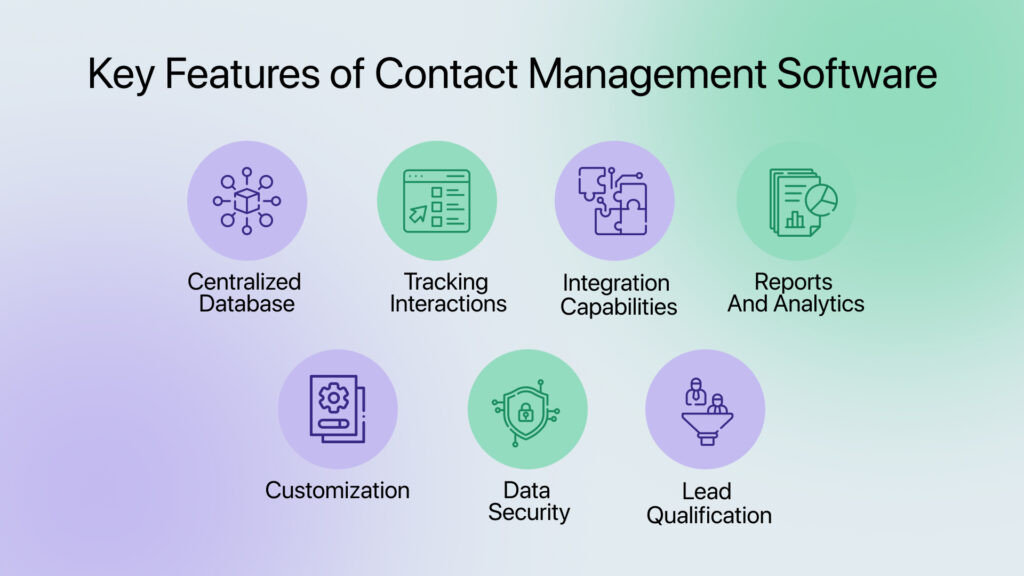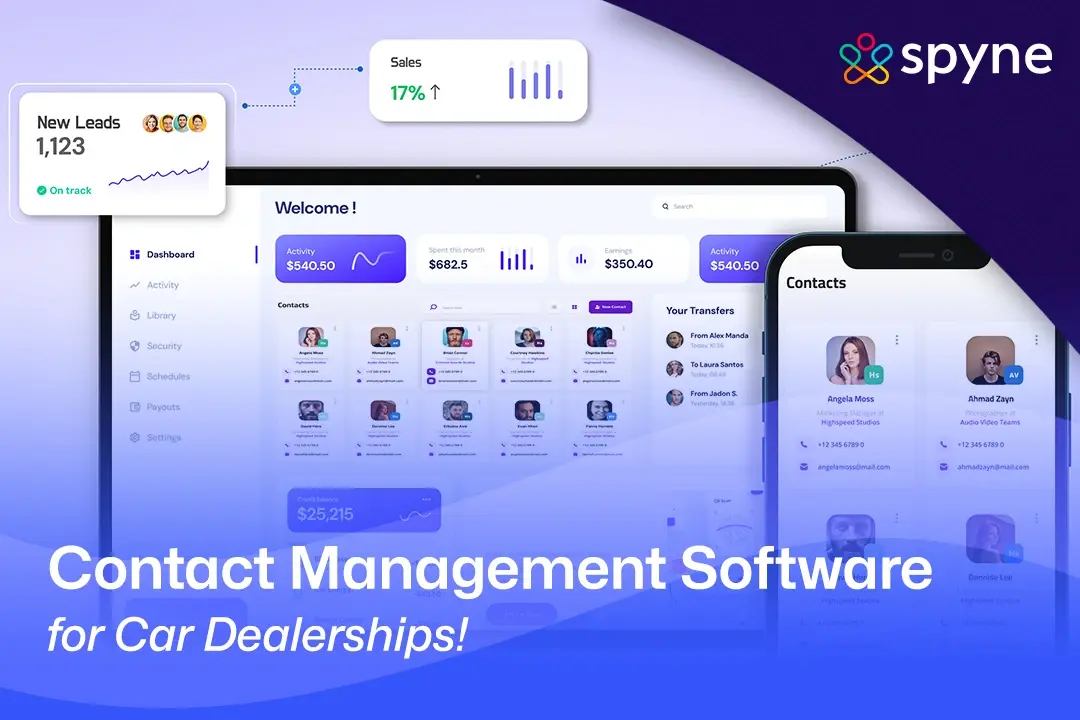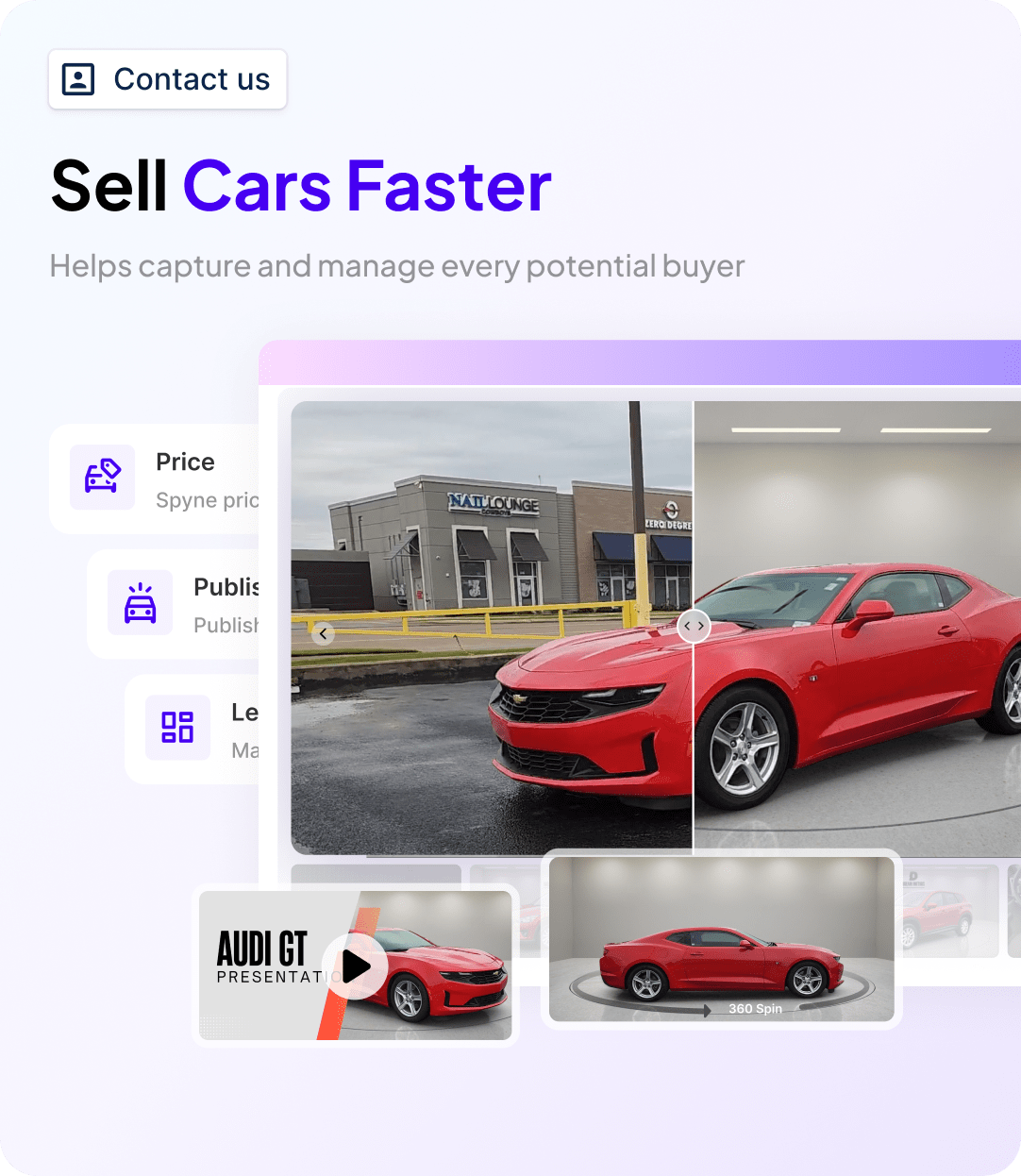Customers are the fuel for every business to keep running; hence, their information should be kept safe and organized. Businesses find it difficult to search for customer details with the scattered information. To address this problem, contact management software comes into the picture. It helps car dealers foster a strong relationship with their customers by keeping the data of their customers organized and analyzing their needs, which align with their preferences, to serve them the desired service.
This blog highlights what contact software is, its benefits, key features, and the top software for your business to improve your customer service, streamline workflow, and drive growth.
What is Contact Management Software?
The contact management software is a tool used by businesses to track, organize, and manage customer contacts. It is a centralized repository for storing contacts to deliver a personalized customer experience and enhance communication strategies. Disorganized or missed customer information can be overwhelming, causing delays or missed responses.
A well-organized customer database stays updated, is easily accessible to all departments, and saves time from manual data entries, reducing the chances of input errors. The customer service management system integrates well with other dealership systems, increasing their operational efficiency.
Top 6 Benefits of Using Contact Management Software
The contact relationship management software offers a wide range of benefits to improve data organization, streamline business processes, and enhance customer satisfaction. To list some benefits of contact software, we have included managing leads and customer interactions efficiently, increasing sales, customer retention, and driving business performance.
1. Centralized Customer Data with Accuracy
Organized and accurate data is something that every business requires. The contact management system offers a centralized customer database to keep everyone on the same page, improving collaboration among teams. Additionally, it avoids manual data entries, ensuring accurate data is circulated among the departments.
2. Data-Driven Decision Making via Deeper Insights
The contact management software for small business provides valuable insights into customer interactions, historical data, and sales performance. This enables you to identify customer preferences, industry trends, and purchasing habits to make precise decisions for your business growth.
3. Enhanced Communication and Customer Relationships
Gaining a deep understanding of customer behavior and preferences through the customer database allows you to deliver personalized lead response, offers, and recommendations to customers, enhancing their satisfaction levels.
4. Efficient Lead Management and Sales Outcomes
The contact software for businesses effectively categorizes leads based on various criteria and launches marketing campaigns to target a specific segment of customers. In addition to this, it maintains the sales pipeline by focusing on high-intent buyers who are most likely to convert.
5. Reduced Costs with Scalability
The crm contact management reduces manual efforts, so it saves you costs for hiring staff or investing in multiple systems and tools for various business fixed operations. It is also scalable enough to resonate its capabilities with your growing business, increasing the revenue model.
6. Workflow Optimization for Improved Productivity
Automating tasks like sending follow-ups, scheduling appointments, or data entry can be accomplished by contact center workforce management software. It reduces the response times and frees up your staff to focus on core sales activities, hence improving productivity.
What are the Limitations of a Contact Management Software?
Though customer service management systems have shifted rapidly from paper-based systems to digital contact databases, it has several limitations. Although technological advancements have been made, businesses consider it a basic tool for storing contacts and names. The contact management software for small business, especially, could have high implementation costs and a complex learning process, preventing employees from adopting the contact management apps. Businesses could also face challenges in managing high volumes of data and integrating software with other systems.
Despite these limitations, the call center services software is continuing to improve, enabling businesses to start using the software contact manager for a unified customer database.
Top 7 Key Features of Contact Management Software
The contact management software has several key features for businesses to help them manage and organize customer data, including customer interaction tracking, lead management, etc. This enables sales and customer service departments to foster long-term buyer relationships and drive business efficiency.
1. Organized Database to Search for Contacts Easily
The client relationship manager software stores and organizes customer information in a single place to be easily accessible to anyone in the business organization. This makes it easy to search for any contact or information, reducing customer wait times.
2. Track of Customer Interactions
The WFM software call center facilitates businesses by having a track of customer interactions through call monitoring software. This helps you analyse the performance of agents, the response times, and identify high-quality prospects, leading to increased conversion rates.
3. System Integration Capabilities
Advanced contact management software free is capable of integrating seamlessly with other business tools like CRM, email, and social media platforms to sync data, keeping it updated.
4. Customer Data Analytics and Reports
Businesses can get insights into customer interactions, ongoing trends, conversion rates, and other BDC metrics to identify their preferences. This enables you to make data-driven decisions and enhance customer communication strategies for your business.

5. Customizable Dashboard
While every business model varies depending on its goals and requirements, its contact tracking software also varies, aligning its capabilities to meet these goals. It offers customization options to sort and filter contacts according to specific business needs.
6. Secured Customer Details
Modern buyers are concerned about their data. The crm software call center has built-in security protocols, encryption features, and multiple authentication steps to avoid data breaches and the leaking of sensitive information.
7. Manage and Qualify High-Quality Leads
Capturing and managing leads from various sources is made easy with the workforce management contact center. It identifies high-intent buyers across various channels like email, website, or calls through an omnichannel contact center to engage with them efficiently.
How to Choose the Right Contact Management Software for Your Business?
Businesses need to consider effective data organization, data security features, and customization with budget-friendly solutions to choose the right contact management application for efficient workflow and improved customer service. Here are a few tips you can consider:
1. Define Goals and Business Processes
Define clear goals and workflow processes of your business to make the most out of your contact management software, such as increased sales and customer retention or automation capabilities.
2. User-Friendliness and Mobile Access
Businesses need to ensure that the contact management crm system they choose must support mobile usage and have an easy-to-access interface for employees requiring minimal software training.
3. Ensure System Integrity
Seamless connectivity is a must for an effective software contact manager. It should support integration with automotive CRM, email, and other social media platforms to gain visibility into customer interactions.
4. Perform Testing and Gather Feedback
Conduct comprehensive testing and trials, and gather feedback to identify the flaws in the call center customer relationship management and make required improvements. This helps you to choose the right one among the BDC companies for your business.
5. Scalable and Cost-Effective Solution
The contact relationship management system should be able to accommodate high volumes of data as the business scales. Also, consider the pricing structure of the software that fits in your business model without breaking your bank.
6. Prioritize Data Compliance
Prioritize data security with TCPA compliance and data privacy regulations for securing sensitive customer information, including names, phone numbers, email addresses, etc., to boost customer loyalty.
11 Best Contact Management Software for Your Business
The contact relationship management software is necessary for a business to have an organized record of its customer information. You have to choose the software that fits your business requirements effectively. Here is a list of 11 contact management software to look for.
1. Spyne
Spyne provides a performance-driven contact relationship management, providing an end-to-end solution for car dealerships to boost their sales and enhance customer relationships. We help you capture leads, automate workflow, and track customer interactions to gain insights into their preferences, providing customized solutions to their specific needs.
Pros
- Automated follow-ups, test drive booking, and appointment scheduling
- Centralized hub for customer information
- Smart lead capturing and qualification
- Personalized follow-up messages, services, and offers
- Provides conversational AI tools for human-like interactions with customers
Cons
- Designed specifically for automotive businesses
2. VinSolutions
Vin solution has a productive contact tracking software that gives a smooth operation for the dealerships to improve their sales and performance.
Pros
- Provides a central hub for managing all contacts
- Detailed reports and analytics
Cons
- Complex interface and requires training for new users
3. DealerOn
DealerOn provides tools to manage their presence online and interactions with customers. Helps dealerships to organize and track customer data.
Pros
- Better communication support for enhanced customer experience
- Cost saving and better resource allocation
Cons
- Staff members can require training and follow BDC tips for operating new systems
4. Agile CRM
Agile CRM works with a perspective of both customer and sales improvement. It has a collection of tools that focuses on marketing, managing sales, and customer relationships.
Pros
- Single dashboard for sales, marketing, and customer service
- Affordable and scalable solution with integration capabilities
Cons
- Have a steep learning curve
5. DealerTrack
DealerTrack offers a comprehensive contact software with operational efficiency, enhanced customer relationships, and easy integrations.
Pros
- Easy to access centralized platform
- Instant customer support to resolve queries
Cons
- Keeps a limited record of customer history
6. AutoRaptor
Autoraptor serves a collection of different tools to manage the sales and build strong relationships with customers.
Pros
- Schedules tasks and appointments
- Easy-to-use interface with cost-effective solutions
Cons
- Limited functions for mobile usage
7. DealerCenter
DealerCenter’s automotive CRM software for client relationship management changes the way of dealing with customers, managing sales, and sending follow-up reminders.
Pros
- Comprehensive features with mobile usability
- Provides understanding of customer trends
Cons
- Steep learning curve for staff to adopt the software
8. Reynolds and Reynolds
Reynold and Reynolds serves with a strong contact management application named FOCUS, which helps in improving business efficiency within the dealerships.
Pros
- Efficient operations for increased profitability
- User-friendly interface
Cons
- Limited customization options for users
9. Hubspot CRM
Hubspot offers a contact management program and many more features that improve customer experience and increase collaboration among the team.
Pros
- Strong integration with numerous tools
- The free version provides a strong foundation for software
Cons
- Require investment for upgrading features
10. Zoho CRM
Zoho CRM offers benefits for businesses seeking customization and cost-effective solutions. In addition to this, it provides comprehensive solutions for managing customer interactions.
Pros
- Seamless integrations for data flow
- Customizable reports and analytics to track KPIs
Cons
- Limited features in low-tier plans
11. Pipedrive
Pipedrive facilitates dealerships in contact management and lead generation through automation and customizable solutions.
Pros
- Visual representation of sales pipeline
- Valuable reports through customizable dashboards
Cons
- Limited customer support in lower plans
How did Contact Management Software Evolve into Customer Relationship Management?
The contact software focused on basic customer data storage in the initial phases, later on considering integration of sales, marketing, and customer service processes, hence evolving into advanced customer relationship management (CRM) systems. This evolution of contact management software to a CRM system has occurred because of the following key developments:
- Businesses focused on building strong relationships with customers, moving beyond storing contact details
- Individual spreadsheets and databases are converted into shared desktops, making the data accessible to different departments
With the use of CRM software, contact management becomes effortless. It can automate follow-ups, analyze the effectiveness of targeted marketing campaigns, and monitor the performance of individual departments of a business.
Contact Management Software and CRM System
The contact management software is now changing into cloud-based CRM software, which enables businesses to access customer data remotely with a good internet connection. This enhances collaboration among sales, marketing, and customer service departments to streamline processes and enhance customer experience.
The cloud-based contact software integrates well for a seamless workflow and provides automation features to reduce manual workload. This enables businesses to improve their sales processes through efficient lead management, tracking of sales pipeline, and automation in customer communication tools, as well as marketing campaigns.
Why Spyne’s Contact Management Software is Ideal for Your Car Dealership?
Spyne offers a comprehensive solution as contact management software tailored specifically for automotive businesses. Whether you are a small or large dealership, our Retail AI goes beyond storing names and numbers to provide AI-powered automation for your dealership operations.
1. Prioritization of High-Intent Leads
Our customer service management system allows automatic prioritization of hot leads by AI lead scoring for car dealerships, enabling sales reps to focus on converting them into potential buyers.
2. Automated Workflow to Improve Efficiency
No need to waste your energy on repetitive and time-consuming tasks like sending follow-up messages, setting up service appointments, and booking test drives. Our automated lead follow up system for car dealerships takes over these tasks for you to focus on revenue-generating activities.
3. System Integration for Full Visibility
Spyne CRM provides full visibility into workflow, customer interactions, and sales pipeline by integrating seamlessly with other dealership systems. We keep the data updated, error-free, and prevent you from having to switch between tools.
4. Omnichannel Engagement with Bilingual Support
Imagine a contact software capturing leads from various sources and engaging them in different languages. Our AI enables you to deliver real-time responses across different channels with a bilingual answering service in their native language.
5. Affordable and Scalable Option
Spyne is an affordable option for contact management software for small business or medium to large businesses, providing scalability as your automotive business grows.
6. Smart Call Handling
We help you handle incoming and outgoing calls through our call center customer relationship management, providing features like call diversion, routing calls to the right sales reps, and providing real-time transcriptions of calls to gain insights into customer behavior and preferences.
Conclusion
Contact management software is the backbone for any dealership to succeed. In a competitive automotive industry like today’s, dealerships using contact management systems flourish more than those without. From storing contact information to managing it, building strong relationships with customers, and turning more leads into profitable buyers, it does all that with the blink of an eye.
Spyne provides automation with the power of artificial intelligence to optimize your workflow, enhance customer relationships, and streamline your sales performance. Book a free demo to see how Spyne manages your contacts and accelerates your revenue growth.
Disclaimer: These services are included for comparative purposes. Spyne is not affiliated with the other tools listed; their inclusion does not constitute endorsement.
















